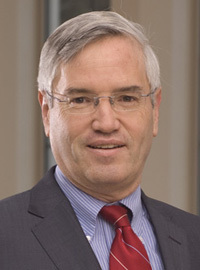
Gregory Timp has been named the Keough-Hesburgh Professor of Electrical Engineering and Biological Sciences at the University of Notre Dame.
The first joint appointment between the College of Engineering and the College of Science, Timp’s position is indicative not only of the interdisciplinary nature of his work, but it also signifies the start of a new University program in synthetic biology, which is part of the biomedical initiative on campus. The program seeks to mimic biology on the nanometer scale with man-made constructs for applications in tissue engineering, epigenetics and DNA sequencing, and will be featured within the University’s Advanced Diagnostics and Therapeutics Initiative.
Timp is a recognized authority on nanotechnology, which he has used to produce everything from nanometer-scale transistors with world-record performance to synthetic nanopores for sequencing DNA. Over the last ten years, he has focused his efforts on the nanometer-scale machinery in living cells. For example, he rewires gene networks to co-opt the molecular biology of living cells for applications such as biocomputing. Specifically, Timp assembles genetically programmed bacteria that act like biochemical signal transmitters, receivers and logic gates, using a combination of microfluidics, which function like capillaries conveying the cells to an assembly area. He uses arrays of optical tweezers to precisely organize the programmed cells with nanometer-scale precision into a simple computer.
Most recently, Timp served as a professor in the Department of Electrical and Computer Engineering, the Beckman Institute for Advanced Science and Technology, the Center for Biophysics and Computational Biology, and the Institute of Genomic Biology at the University of Illinois at Urbana-Champaign. He previoiusly worked as a member of the technical staff of Bell Laboratories on a number of projects, including using light as a lens for atomic-scale lithography, nanometer-scale transistors and quantum mechanical transport through wires so small that they act like electron waveguides.
Among the frequently cited scholars in the field of nanotechnology, Timp has published more than 100 articles in refereed journals, given more than 100 invited and plenary seminars and co-authored several books on nanotechnology. He also holds several patents.
Timp is a fellow of the American Association for the Advancement of Science, the American Physical Society and the Institute of Electrical and Electronic Engineers. In addition, he is a fellow and founding member of the American Academy of Nanomedicine, as well as a member of the American Biophysical Society, the American Vacuum Society and the Electrochemical Society.
He received his doctorate and his master’s in 1984 and 1980, respectively, in electrical engineering from the Massachusetts Institute of Technology, and his bachelor’s degree, also in electrical engineering, from the University of Illinois at Urbana-Champaign in 1978.